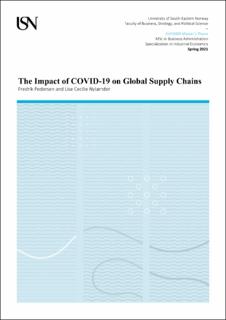| dc.description.abstract | In a short period of time, the COVID-19 pandemic has had a dramatic impact on the whole world and changed the way we live our lives. Global supply chains, which are highly dependent on geopolitical factors, have seen major disruptions in their operations as a result of COVID-19. This has resulted in shortages and shifts in demands, leading to severe delays both from the suppliers and to the end customer.
The purpose of the master thesis is to discover how various firms have been impacted by COVID-19, as well as how they can become better prepared for future disruptions in their supply chain. The master thesis is based on the literature review from the preliminary thesis, which revealed a clear need for more robust and resilient supply chains.According to Taleb, today’s global supply chains have become especially vulnerable to disruptions, as they have chased for higher efficiency and consequently paid less attention to risk management strategies (Taleb, 2012).
From the theoretical findings, we established four factors that we see as the most important for a firm’s ability to handle disruptions. Those are complexity, communication, risk management and geopolitical factors. Additionally, we created eight propositions, that we confirmed or denied through our findings. For our study, we wanted to use a qualitative approach by gathering information through 10 in-dept interviews. This provided detailed information from multiple firms where we discovered the differences and similarities between them. In the empirical findings we identified that few of the firms were prepared for the pandemic. While all of them were affected in some way, the larger and more robust firms managed themselves better than the smaller ones. Although several of the firms had a decline in sales and were forced to lay-off some of their employees, most of the firms managed to get back on schedule relatively quickly with few delays to the end customer.
From the discussion, we established several measures that firms can incorporate to become better prepared for future disruptions. The most essential are analysis of the firm’s stakeholders and becoming aware of the risk involved with each supplier, having a safety stock of critical components that potentially can lead to bottle necks in the production and lastly the shift to digitalized supply chains that will enhance the communication flow and transparency with the supply chain partners. This study contributes to increased knowledge and understanding of the four factors that are essential for a firm to handle disruptions, as well as measures the firms can take to be more robust and resilient for future disruptions in the supply chain. This is especially important to be aware of in an uncertain future where disruptions occur more frequently. | |
